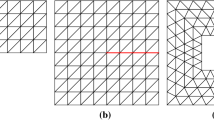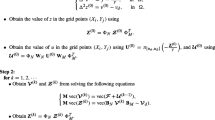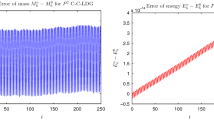Abstract
Optimal control of systems governed by elliptic partial differential equations (PDEs) without constraint on the set of controls can be equivalently reformulated as a coupled system of second order elliptic PDEs, which has been considered to solve by a non-overlapping Schwarz domain decomposition method with the non-coupled, the partially-coupled and the fully-coupled Robin-like transmission conditions by Benamou (SIAM J Numer Anal 33:2401–2416, 1996) where a convergence analysis had been performed. Towards fast convergence of the overlapping and non-overlapping Schwarz subdomain iterations, in this paper we firstly perform, for fixed Tikhonov parameter \(\mu \), rigorous analyses based on optimization of the convergence factor of subdomain iterations in Fourier frequency domain to give the optimized transmission parameters involved in the above mentioned transmission conditions, as well as those involved in a Ventcell-like and a two-sided Robin-like transmission condition that we propose to accelerate the Schwarz subdomain iterations, and meanwhile we obtain also the corresponding asymptotic convergence rate estimates. The results show that the Tikhonov parameter \(\mu \) occurs in both the optimized transmission parameters and the corresponding convergence rate estimates and affects the performance of the Schwarz domain decomposition methods significantly: when \(\mu \) is less than a certain threshold value, with the decreasing of the Tikhonov parameter \(\mu \), the subdomain iteration converges more and more fast, though the regularity of the system deteriorates in this process. We lastly investigate the case where the Tikhonov parameter \(\mu =h^4\) that is suggested by Benamou (where h is the mesh size). We obtain as well the optimized transmission parameters involved in the non-coupled, the partially-coupled and the fully-coupled Robin-like transmission conditions, and find that they lead to optimized Schwarz methods that are very robust in the mesh size. The analysis also sheds light on optimizing the Schwarz domain decomposition methods for biharmonic equations, since they can also be reformulated as a system of second order elliptic PDEs. We use various numerical experiments to illustrate the theoretical findings.







Similar content being viewed by others
References
Benamou, J.D.: Domain decomposition methods with coupled transmission conditions for the optimal control of systems governed by elliptic partial differential equations. C. R. Acad. Sci. Paris 317, 205–209 (1993)
Benamou, J.D.: A domain decomposition method with coupled transmission conditions for the optimal control of systems governed by elliptic partial differential equations. SIAM J. Numer. Anal. 33(6), 2401–2416 (1996)
Benamou, J.D.: Domain decomposition, optimal control of systems governed by partial differential equations, and synthesis of feedback laws. J. Optim. Theory Appl. 102(1), 15–36 (1999)
Benamou, J.D., Despres, B.: A domain decomposition method for the Helmholtz equation and related optimal control problems. J. Comput. Phys. 136(1), 68–82 (1997)
Bennequin, D., Gander, M.J., Halpern, L.: A homographic best approximation problem with application to optimized Schwarz waveform relaxation. Math. Comp. 78(265), 185–223 (2009)
Blayo, E., Cherel, D., Rousseau, A.: Towards optimized Schwarz methods for the Navier–Stokes equations. J. Sci. Comput. 66(1), 275–295 (2016)
Bouajaji, M.E., Dolean, V., Gander, M.J., Lanteri, S.: Optimized Schwarz methods for the time-harmonic Maxwell equations with damping. SIAM J. Sci. Comput. 34(4), A2048–A2071 (2012)
Chang, H., Yang, D.: A Schwarz domain decomposition method with gradient projection for optimal control governed by elliptic partial differential equations. J. Comput. Appl. Math. 235(17), 5078–5094 (2011)
Chen, Z., Gander, M.J., Zhang, H.: On the relation between optimized Schwarz methods and source transfer. In: Dickopf, T., Gander, M.J., Halpern, L., Krause, R., Pavarino, L.F. (eds.) Domain Decomposition Methods in Science and Engineering XXII, pp. 217–225. Springer International Publishing, Berlin (2016)
Chen, Z., Xiang, X.: A source transfer domain decomposition method for Helmholtz equations in unbounded domain. SIAM J. Numer. Anal. 51(4), 2331–2356 (2013)
Discacciati, M., Gerardo-Giorda, L.: Optimized Schwarz methods for the Stokes-Darcy coupling. IMA J. Numer. Aanal. 38(4), 1959–1983 (2018)
Dolean, V., Gander, M.J., Gerardo-Giorda, L.: Optimized Schwarz methods for Maxwell’s equations. SIAM J. Sci. Comput. 31(3), 2193–2213 (2009)
Dubois, O., Gander, M.J., Loisel, S., St-Cyr, A., Szyld, D.B.: The optimized schwarz method with a coarse grid correction. SIAM J. Sci. Comput. 34(1), A421–A458 (2012)
Engquist, B., Ying, L.: Sweeping preconditioner for the Helmholtz equation: moving perfectly matched layers. Multiscale Mode. Simul. 9(2), 686–710 (2011)
Gander, M.J.: Optimized Schwarz methods. SIAM J. Numer. Anal. 44(2), 699–731 (2006)
Gander, M.J.: Schwarz methods over the course of time. Electron. Trans. Numer. Anal. 31, 228–255 (2008)
Gander, M.J., Halpern, L.: Absorbing boundary conditions for the wave equation and parallel computing. Math. Comp. 74(249), 153–176 (2005)
Gander, M.J., Halpern, L.: Optimized Schwarz waveform relaxation methods for advection reaction diffusion problems. SIAM J. Numer. Anal. 45(2), 666–697 (2007)
Gander, M.J., Halpern, L., Nataf, F.: Optimal Schwarz waveform relaxation for the one dimensional wave equation. SIAM J. Numer. Anal. 41(5), 1643–1681 (2003)
Gander, M.J., Liu, Y.: On the definition of dirichlet and neumann conditions for the biharmonic equation and its impact on associated schwarz methods. In: Lee, C.O., Cai, X.C., Keyes, D.E., Kim, H.H., Klawonn, A., Park, E.J., Widlund, O.B. (eds.) Domain Decomposition Methods in Science and Engineering XXIII, pp. 303–311. Springer International Publishing, Cham (2017)
Gander, M.J., Magoulès, F., Nataf, F.: Optimized Schwarz methods without overlap for the Helmholtz equation. SIAM J. Sci. Comput. 24(1), 38–60 (2002)
Gander, M.J., Xu, Y.: Optimized schwarz methods for circular domain decompositions with overlap. SIAM J. Numer. Anal. 52(4), 1981–2004 (2014)
Gander, M.J., Xu, Y.: Optimized Schwarz methods for model problems with continuously variable coefficients. SIAM J. Sci. Comput. 38(5), A2964–A2986 (2016)
Gander, M.J., Xu, Y.: Optimized Schwarz methods for domain decompositions with parabolic interfaces. In: Lee, C.O., et al. (eds.) Domain Decomposition Methods in Science and Engineering XXIII, pp. 323–332. Springer, Cham (2017)
Gander, M.J., Xu, Y.: Optimized Schwarz methods with nonoverlapping circular domain decompositions. Math. Comp. 86(304), 637–660 (2017)
Heinkenschloss, M., Nguyen, H.: Balancing Neumann–Neumann methods for elliptic optimal control problems. Lecture Notes in Computational Science and Engineering, vol. 40, pp. 589–596. Springer, Berlin, Heidelberg (2005)
Heinkenschloss, M., Nguyen, H.: Neumann-Neumann domain decomposition preconditioners for linear-quadratic elliptic optimal control problems. SIAM J. Sci. Comput. 28(3), 1001–1028 (2006)
Herzog, R., Rheinbach, O.: FETI-DP methods for optimal control problems. In: Erhel, J., Gander, M.J., Halpern, L., Pichot, G., Sassi, T., Widlund, O. (eds.) Domain Decomposition Methods in Science and Engineering XXI, pp. 387–395. Springer International Publishing, Cham (2014)
Hou, L.S., Lee, J.: A Robin-Robin non-overlapping domain decomposition method for an elliptic boundary control problem. Int. J. Numer. Anal. Model. 8(3), 443–465 (2011)
Japhet, C.: Domain decomposition methods and artificial boundary conditions in fluid dynamics: Optimized Order 2 method. Ph.D. thesis, Université Paris 13 (1998)
Lagnese, J.E., Leugering, G.: Domain Decomposition for Elliptic Optimal Control Problems, pp. 107–129. Birkhäuser, Basel, Basel (2004)
Lions, J.L.: Contrôle Optimal De Systemes Gouvernés Par Des Équations Aux Dérivées Partielles. Dunod (1968)
Lions, P.L.: On the Schwarz alternating method. III: a variant for nonoverlapping subdomains. In: Third International Symposium on Domain Decomposition Methods for Partial Differential Equations, vol. 6, pp. 202–223. SIAM, Philadelphia, PA (1990)
Magouls, F., Ivnyi, P., Topping, B.: Non-overlapping Schwarz methods with optimized transmission conditions for the Helmholtz equation. Comput. Methods Appl. Mech. Eng. 193(45–47), 4797–4818 (2004)
Martin, V.: An optimized Schwarz waveform relaxation method for the unsteady convection diffusion equation in two dimensions. Appl. Numer. Math. 52(4), 401–428 (2005)
Pearson, J.W., Stoll, M.: Fast iterative solution of reaction–diffusion control problems arising from chemical processes. SIAM J. Sci. Comput. 35(5), 987–1009 (2013)
Qin, L., Xu, X.: Optimized Schwarz methods with Robin transmission conditions for parabolic problems. SIAM J. Sci. Comput. 31(1), 608–623 (2008)
Rees, T., Dollar, H.S., Wathen, A.J.: Optimal solvers for PDE-constrained optimization. SIAM J. Sci. Comput. 32(1), 271–298 (2010)
Rees, T., Stoll, M.: Block-triangular preconditioners for PDE-constrained optimization. Numer. Linear Algebra Appl. 17(6), 977–996 (2010)
Schwarz, H.A.: Über einen Grenzübergang durch alternierendes Verfahren. Vierteljahrsschrift der Naturforschenden Gesellschaft in Zürich 15, 272–286 (1870)
Shang, Y.Q., He, Y.N.: Fourier analysis of schwarz domain decomposition methods for the biharmonic equation. Appl. Math. Mech. 30(9), 1177–1182 (2009)
Xu, Y.: The influence of domain truncation on the performance of optimized Schwarz methods. Electron. Trans. Numer. Anal. 49, 182–209 (2018)
Xu, Y.: Optimized Schwarz methods with Ventcell transmission conditions for model problems with continuously variable coefficients. J. Comput. Appl. Math. 334, 97–110 (2018)
Author information
Authors and Affiliations
Corresponding author
Additional information
Supported by NSFC-11671074, 11471047 and the Fundamental Research Funds for the Central Universities (No. 2412018ZD001).
Rights and permissions
About this article
Cite this article
Xu, Y., Chen, X. Optimized Schwarz Methods for the Optimal Control of Systems Governed by Elliptic Partial Differential Equations. J Sci Comput 79, 1182–1213 (2019). https://doi.org/10.1007/s10915-018-0886-4
Received:
Revised:
Accepted:
Published:
Issue Date:
DOI: https://doi.org/10.1007/s10915-018-0886-4




